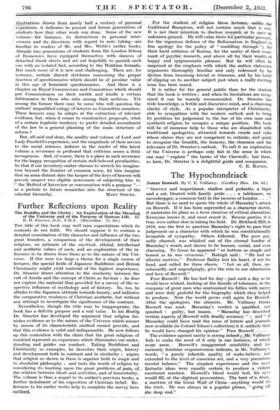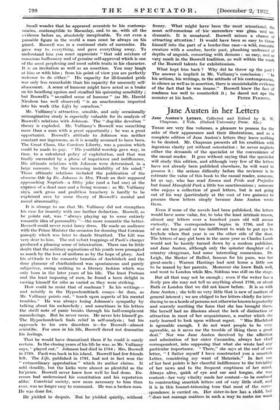The Hypochondriack-
James Boswell. By C. E. Vulliamy. (Geoffrey Bles. 10s. 6(1.) " SERVILE and impertinent, shallow and pedantic, a bigot and a sot, bloated with family pride . . . a talebearer, an eavesdropper, a common butt in the taverns of London . . . " But there is no need to quote the whole of Macaulay's attack on Boswell. If it has been superseded. as a character sketch, it maintains its place as a locus classicus of ,critical aberration. Everyone knows it, and most resent it. Rescue parties, it is true, were rather slow in taking the field. Dr. Birkbeck Hill, in 1878, was the first ,to question Macaulay's right to--pass-flnal judgement on a character with which he was constitutionally incapable of sympathy. Others followed. The poor guy, sadly charred, was whisked out of the eternal bonfire of Macaulay's wrath and shown to be human, venial, and even charming. To Gosse he appeared " at bottom as -simple and honest as he was vivacious." Raleigh said : " He had no ulterior motives." Professor Bailey lost his heart, if not his head, and. called for three cheers. " Let us all, then, un:. ashamedly and ungrudgingly, give the rein-to our admiratiOn and love of Boswell."
Poor Boswell ! He has had his day—just such a day as he would have wished, basking at the fireside of tolerance, in the company of great men who anatomized his follies with mercy and were duly grateful for the biography which they helped to produce. Now the 'world grows cold. again for Boswell. After the etiologists, the alienists. Mr. Vulliamy thinks Boswell was mad. Macaulay's verdict is qualified, not quashed : guilty, but insane. " Macaulay has ' described certain aspects of Boswell with deadly' accuracy " ; and " if Macaulay could have read the mass of_letters and journals now available (in *Colonel Isham's collection) it is unlikely that he would have changed his opinion." Poor Boswell . . . .
The evidence against sanity is strong indeett-,;,gdr.-Viillitimy fails to make the most of it only in one instance, of which
more anon. Boswell's exaggerated sensibility send his curiously feminine responsiveness -indicate, in Mr. Vulliamy's words, " a purely infantile quality of make-believe, not extended to the level of conscious art, and a very precarious mental balance." The simplest experiences and the most fantastic ideas were equally - certain - to produce a violent emotional reaction. Boswell's blood would boil, his eyes would fill, at the'slightest provocation. The beat Of a drum, a mention_ of the Great Well of China—anything would do the trick. He was always in a popular phrase, " going off the deep end."
Small wonder that he appeared eccentric to his contemp- oraries, _nontemptibla to Macaulay, and. to us,- -with all the evidence before us, absolutely inexplicable. To cut even a passable figure in the world a man must be always on his guard. Boswell was in a continual state of surrender. He gave way to everything, and gave everything away. To understand him you must appreciate " that odd mixture of conscious buffoonery and of genuine self-approval which is one of the most perplexing and most subtle traits in his character. It is an invitation as well as an assertion. You may laugh at him or with him ; from his point of view you are perfectly welcome to do either." His capacity for ill-founded pride was only less remarkable than his capacity for unseemly self- abasement. A sense of humour might have acted as a brake on his headlong egoism and steadied his quivering sensibility ; but Boswell's " so-called sense of humour " (as Mr. Harold Nicolson has well observed) " is an anachronism imported into his work (the Life) by ourselves."
Mr. Vulliamy's' attractive, sensible, and only occasionally unimaginative study is especially valuable for its analysis of Boswell's relations with Johnson. The " dog-like devotion theory is exploded. Mr. Vulliamy's Boswell was something more than a man with a great opportunity ; he was a great opportunist. Boswell's attitude to Johnson was neither constant nor ingenuous, as it is usually assumed to have been. The Great Cham, like Corsican Liberty, was a passion which could be made to pay. " His youthful worship gave way, in time, to a calculated policy of exploitation, and that was finally succeeded by a phase of impatience and indifference. His ultimate relations with Johnson were determined, in a large measure, by the increasing instability of his mind." Those ultimate relations included the publication of the obscene Ode by Dr. Johnson to Mrs. Tin-ale on their supposed approaching Nuptials—a filthy joke (and a had one) at the Otriense of a dead man and a living woman : as Mr. Vulliamy sitYs; such gross and profitless treachery is hardly to be explained save by some theory of Boswell's mental and moral abnormality.
It is strange to me that Mr. Vulliamy did not strengthen his case for insanity with one further deduction. Boswell, as he points out, was " always playing up to some entirely romantic idea of personality "—the more romantic the better. Boswell could never resist fancy dress. He made an audience with the Prime Minister the occasion for donning that Corsican panoply which was later to dazzle Stratford. The kilt was very dear to him. The red velvet trappings of Paoli's charger produced a pleasing sense of intoxication. There can be little doubt that the military aspirations of his youth were prompted as much by the love of uniform as by the hope of glory. And his attitude to the romantic beauties of Auchinleck and the dour glamour of chieftainhood was spontaneous and purely subjective, owing nothing to a literary fashion which was only born in the later years of his life. The least Protean and the least imposing of men, he found a keen delight in eastlig himself for roles as varied as they were striking.
How could he resist that of madman ? In his writings—
and notably in the Hypochondriack essays—he does, as Mr. Vulliamy points out, " touch upon aspects of his mental troubles." He was always losing Johnson's sympathy by talking about his melancholy ; and sometimes in his letters the shrill note of panic breaks through his half-complacent maunderings. But he never raves. He never lets himself go. The Hypochondriack finds relief in self-analysis ; but his approach to his own disorders is—for Boswell—almost scientific. For once in his life, Boswell dared not dramatize his feelings.
That he would have dramatized them if he could is surely certain. In the closing years of his life he was, as Mr. Vulliamy says, " played out." Johnson had died in 1784 ; Mrs. Boswell in 1789. Paoli was back in his island. Boswell had few friends left. The Life, published in 1791, had not in fact won the " extraordinary approbation " which its author claims. It sold steadily, but the kicks were almost as plentiful as the ha'pence. Boswell never knew how well he had done. Ex- cesses had undermined his constitution and his reputation alike: Convivial society, now more necessary to him than ever, was no longer easy to command. He was a broken man. He was done for.
He yielded to despair. But he- yielded -quietly-without What might have been the most sensational, the lest -self-conscious- of -his—surrenders• -was glum -and an. dramatic. It is unnatural. Boswell misses a chance of attracting attention ! It would have been so easy to throw himself into the part of a border-line case—a wild, romantic creature with a sombre, hectic past, plumbing undreamt or depths of anguish, consorting with demons : so• easy, and se verx much in the Boswell tradition, so well within the react of the: Boswell talents for exhibitionism.
What kept him back ? Why did he throw up the part?
The answer is implicit in Mr. Vulliamy's conclusion : Ilt his actions, his writings, in the attitude of his contemporaries, in silence as well as in assertion, there is unmistakable evidence of the fact that he was insane." Boswell knew the face of madness too well to counterfeit it ; he dared not ape the











































 Previous page
Previous page